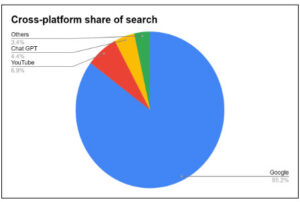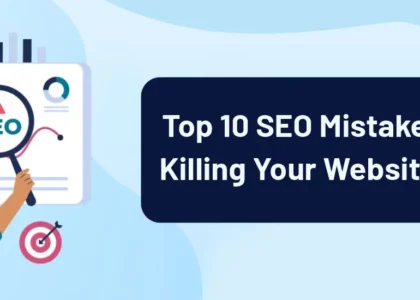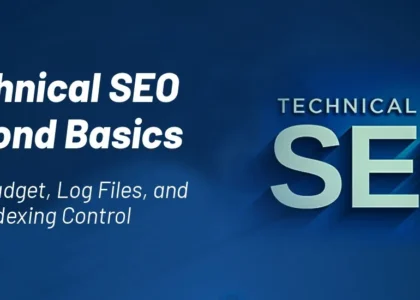Is SEO dead? Discover the truth about the future SEO and Google rankings in 2025.
Introduction
SEO has always been a buzzword. With all the constant changes in the algorithm and the involvement of new technologies, many misconceptions have started to arise. With the SEO rules constantly changing and reshaping, people may think that SEO is dead but not the truth. SEO is evolving into something smarter, more user-focused, and essential for driving organic traffic.
In this blog, we will use relevant information and data to uncover the truth about SEO and its future aspects!
Is SEO dead in 2025?
The simple answer to this question is no, but there are so many changes that are taking place. We need to understand these changes to make a proper statement. The environment around SEO is evolving daily and the changes and adaptations like search price share, Google ranking factor, etc. can be interpreted differently by every individual. We need to understand it deeply with appropriate data:
- The changes in search engine share:

Google has been the search engine monopoly, but according to recent data, ChatGPT, YouTube, and many other platforms have been taking place in search activities in 2024. While the numbers are small, they still pose a common concern. This shows the growing involvement of AI chatbots and platforms and is expected to happen. But it does not significantly mean that any of these can take over the position of Google in the coming several years.
- Active algorithm updates and changes: Google ranking factors have been witnessing significant changes and updates. Google releases more than 12 algorithm changes per day, which involve focusing on content quality and experience. These changes have significantly led to changes in SEO rules and techniques, but they do not promise the end of SEO.
These changes are leveling up the game of SEO rather than decreasing it and SEO is more based on skill, relevance, the ability to quickly adapt to the changes, and quality content that has originality.
Possible reasons for false assumptions
What are the reasons that lead people to ask questions like “Is SEO dead?” There may be certain reasons for this as well, like:
- Changing in Google ranking factors: Many changes, like the diminishing relevance of backlinks and shifting focus from keyword density and specific SEO metrics to improved UX (user experience), may cause changes in the SEO as well.
- Cross-platform searches: It must be understood that people do not use only Google; there are many other search platforms in use. In recent times, the use of AI-based platforms has increased, which may lead to misconceptions about the fall of Google’s monopoly but it is not true as Google still differs with a huge gap in searches and it is not expected to close any soon.
- Changes caused by Google AI overview: Significant changes are taking place because of Google’s AI overview. When a user enters a search, the Google AI overview provides instant answers by analyzing thousands of related websites. Even though it gives easier access to the sources, the clicks are decreasing as most users do not need to click further after the AI Overview.
- The increasing involvement of AI-generated content: AI is powerful and fast at providing needed content, significantly improving its importance. But it must be noted that AI is being used as a tool for humans and businesses to work with, rather than the actual content. Hence, AI is not a replacement but a helping tool to enhance the work.
How to prepare for the evolving future of SEO.
The SEO is changing constantly, but you still need to prepare and improve your website for the best and make an elite user experience. Many factors will help you navigate the challenges of keeping your website at the top of SERPs.
- User experience must be the top priority: Google’s focus is always on good user experience rather than other SEO metrics, and a well-performing website is a great way to build awareness and gain a loyal audience.
- Cater to multi-platforms: Diversity is the key to adapting to the changing environment of SEO. With many other social media platforms being used for searches, increasing diversity can be a good way to increase click-throughs and reach a wider audience across various platforms, like:
- YouTube
- Maintain authority, authenticity, and trustworthiness: Google prioritizes brands that are well-known, authentic, and relevant. So you should focus on showcasing your brand for what it is. You can use customer reviews, interactions, and feedback to gain trustworthiness online and elevate your rank.
- Focus on your niche: Google prefers and shows topic-specific sites for searches and it is beneficial if used correctly. You can make your website and its content niche-specific to find a more relevant audience. It will also help to rank your website better if the Google algorithm picks up the relevant searches to rank your website.
Conclusion
So, is SEO in 2025 dead? The answer is no. The strategies and the tools are constantly evolving, significantly changing the rules of SEO, but SEO remains a vital part of any digital marketing strategy. SEO has been updated and is expected to work even more effectively shortly. It is important to adapt and embrace the changes through proper optimization of important Google ranking factors like relevant brand image, high-quality content, and excellent user experience to stay ahead of the competition.
FAQs
Q1: Is SEO still important in 2025?
Ans: Yes, SEO is still relevant to drive traffic, improve rankings, and upgrade your site’s visibility.
Q2: What’s changed in SEO for 2025?
Ans: SEO now focuses more on user experience, AI, and content that matches search intent.
Q3: Is link-building still important?
Ans: Yes, but focus on getting high-quality, relevant backlinks.
Q4: How can I improve my ranking in 2025?
Ans: You can improve your rankings by creating high-quality content, optimizing for mobile, improving site speed, and building authority.
Q5: Do keywords still matter?
Ans: Yes, but now it’s about using keywords naturally and matching user intent.





